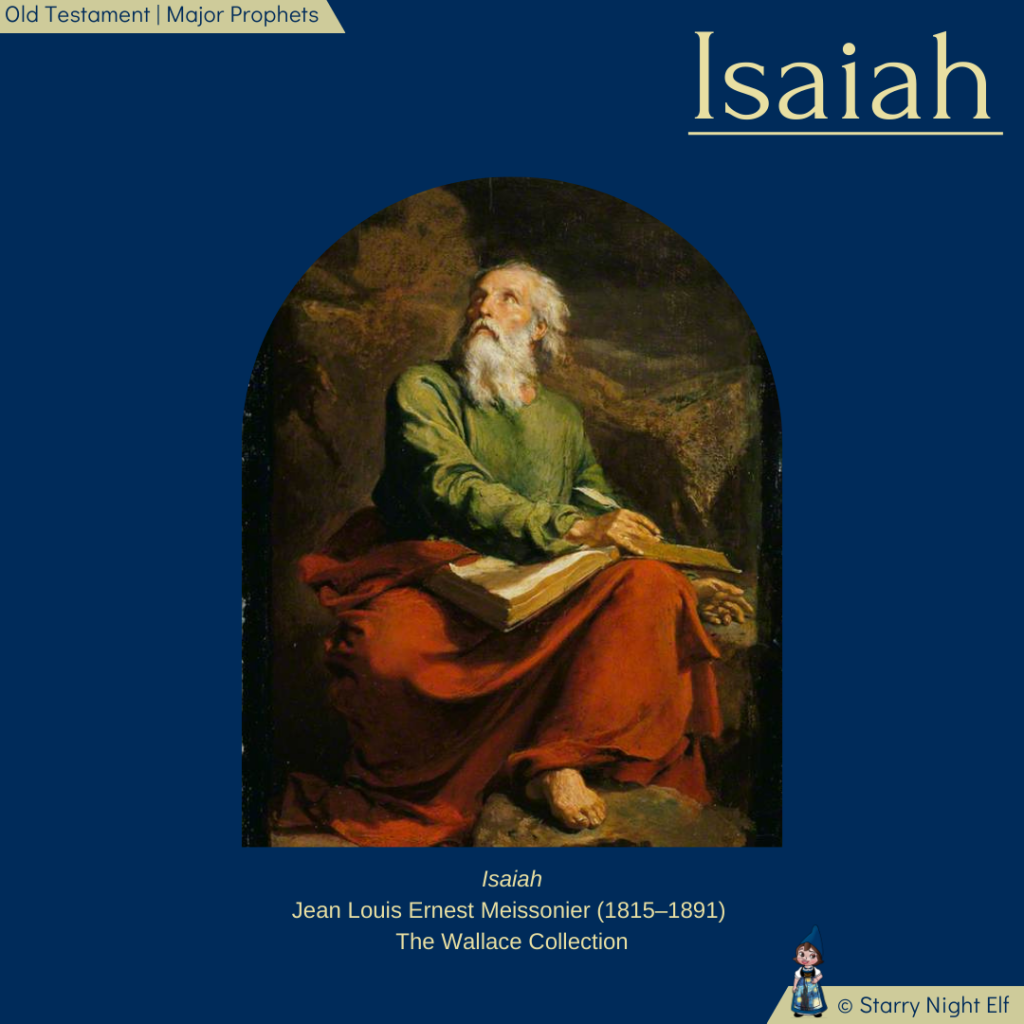
Painting Image Source: Art UK | © Starry Night Elf
Part of a series of Starlight Book Reviews (SBR) on Old Testament (OT) Books. Click here to see other OT SBR.
* The following post transparently exhibits my Christian faith.
5/5 Today, I kick off my Starlight Book Reviews (SBR) for the 2023 Sacred Texts Journey Stellar Reading Challenge (SRC). Last year, I posted SBR on most book groupings of the Bible. As I mentioned in my post on the Epistle of Jude, I left SBR for Prophecy — Major Prophets, Minor Prophets, and New Testament (NT) Prophecy for this year. Click here to see my Epistle of Jude SBR.
Click here to check out the Sacred Texts Journey SRC.
The Major Prophets is a grouping of books in the Christian Old Testament that does not occur in the Hebrew Bible. All of these books are traditionally regarded as authored by a prophet such as Jeremiah, Isaiah, Daniel, and Ezekiel. The term “major” has nothing to do with the achievement or importance of the prophets, rather with the length of the books. In comparison to the books of the Twelve Minor Prophets, whose books are short and grouped together into one single book in the Hebrew Bible, these books are much longer.
This SBR pertains to the first book of the Major Prophets — Isaiah.
“The Book of Isaiah (Hebrew: ספר ישעיהו [ˈsɛ.fɛr jə.ʃaʕ.ˈjaː.hu]) is the first of the Latter Prophets in the Hebrew Bible and the first of the Major Prophets in the Christian Old Testament. It is identified by a superscription as the words of the 8th-century BCE prophet Isaiah ben Amoz, but there is evidence that much of it was composed during the Babylonian captivity and later. Johann Christoph Döderlein suggested in 1775 that the book contained the works of two prophets separated by more than a century, and Bernhard Duhm originated the view, held as a consensus through most of the 20th century, that the book comprises three separate collections of oracles: Proto-Isaiah (chapters 1–39), containing the words of the 8th-century BCE prophet Isaiah; Deutero-Isaiah (chapters 40–55), the work of an anonymous 6th-century BCE author writing during the Exile; and Trito-Isaiah (chapters 56–66), composed after the return from Exile. Isaiah 1–33 promises judgment and restoration for Judah, Jerusalem and the nations, and chapters 34–66 presume that judgment has been pronounced and restoration follows soon. While few scholars today attribute the entire book, or even most of it, to one person, the book’s essential unity has become a focus in more recent research.”
Isaiah daunted me the first time I read it. With the aid of Beth Moore and others, I decided to read this first book among the Major Prophets. With my most recent read, I anticipated with relish both Isaiah 40:31 and the point when Isaiah described Jesus, the savior to come.
I selected the aforementioned passage from Isaiah:
But those who trust in the Lord will find new strength.
Isaiah 40:31
They will soar high on wings like eagles.
They will run and not grow weary.
They will walk and not faint.
Select Bibliography (Alphabetical Order by Author’s Surname)
- Cate, Robert L. (1990b). “Isaiah, book of”. In Mills, Watson E.; Bullard, Roger Aubrey (eds.). Mercer Dictionary of the Bible. Mercer University Press. ISBN 9780865543737.
- Clifford, Richard (1992). “Isaiah, Book of: Second Isaiah”. In Freedman, David Noel (ed.). The Anchor Bible Dictionary. Vol. 3. Doubleday. p. 473. ISBN 0385193610.
- Holy Bible, New Living Translation, copyright © 1996, 2004, 2015 by Tyndale House Foundation.
- Petersen, David L. (2002). The Prophetic Literature: An Introduction. Westminster John Knox Press. ISBN 9780664254537.
- Sweeney, Marvin A. (1998). “The Latter Prophets”. In McKenzie, Steven L.; Graham, Matt Patrick (eds.). The Hebrew Bible Today: An Introduction to Critical Issues. Westminster John Knox Press. ISBN 9780664256524.

